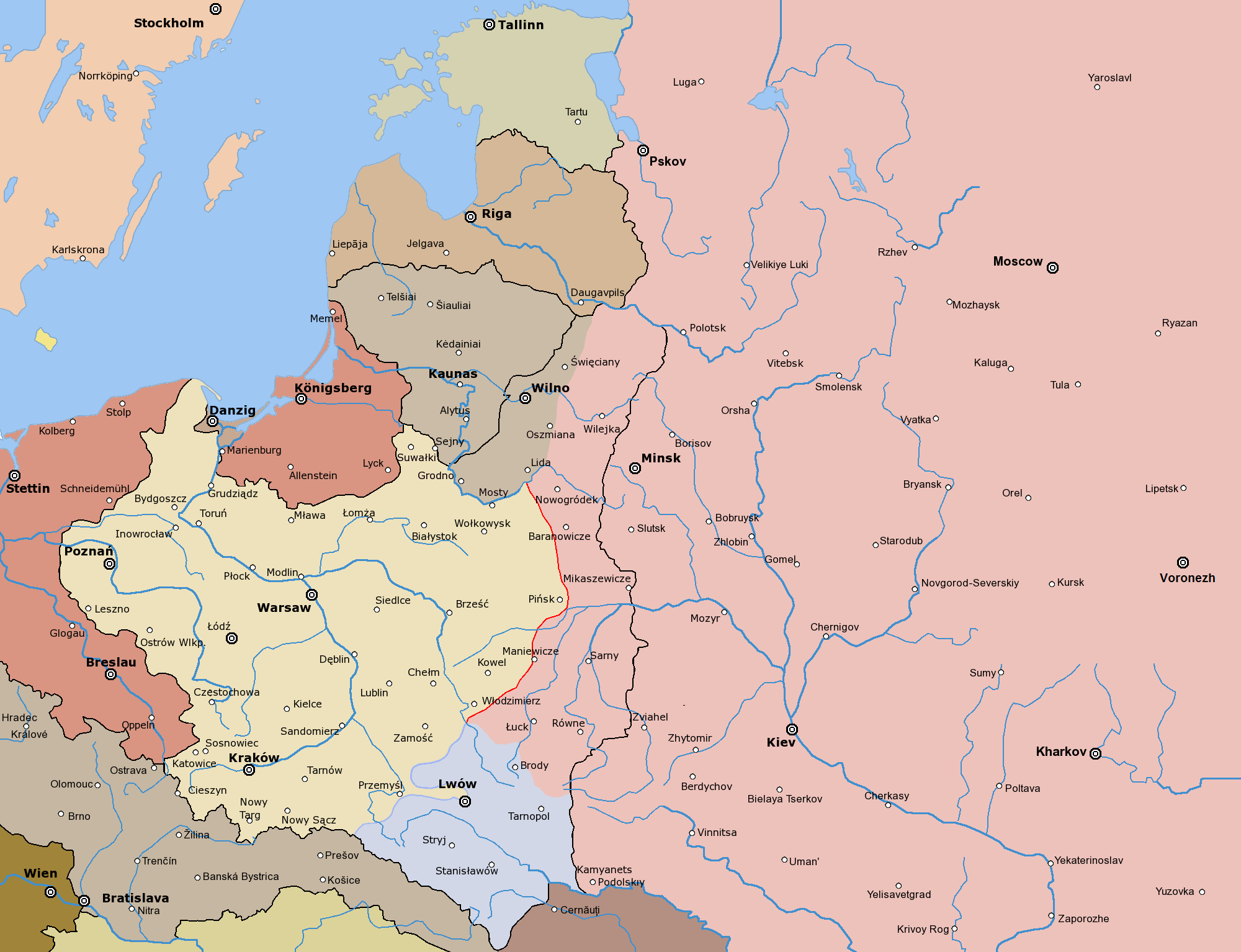|
Polish Soviet Socialist Republic
The Polish Soviet Socialist Republic, abbreviated to Polish SSR, was a proposition by the Provisional Polish Revolutionary Committee to establish a Republics of the Soviet Union, constituent republic of the Soviet Union for the Poles, Polish population, that emerged during the Polish–Soviet War in 1920. The idea assumed the formation of the Soviet republic from the territory of Second Polish Republic, following the Soviet victory in the war, however it was never executed, as Poland won the war in 1921."Tymczasowy Komitet Rewolucyjny Polski" in ''Słownik historii Polski'', Wiedza Powszechna, Warsaw, 1973, p. 504. History The idea was proposed in 1920 by the Provisional Polish Revolutionary Committee during the Polish–Soviet War. It assumed the creation of the Republics of the Soviet Union, constituent republic of Soviet Union for Poles, Polish population from the conquered territories of the Second Polish Republic, following the Soviet victory in the war. The Provisional Poli ... [...More Info...] [...Related Items...] OR: [Wikipedia] [Google] [Baidu] |
PBW March 1919
PBW may refer to: * Philadelphia-Baltimore-Washington Stock Exchange * Peanut Butter Wolf, American hip hop record producer * Proton beam writing, a lithography process * Play by Web, Play-by-post role-playing game * Prosopography of the Byzantine World, a prosopographical database project * Poincaré-Birkhoff-Witt theorem, a result in mathematics {{disambig ... [...More Info...] [...Related Items...] OR: [Wikipedia] [Google] [Baidu] |
Curzon Line
The Curzon Line was a proposed demarcation line between the Second Polish Republic and the Russian Soviet Federative Socialist Republic, Soviet Union, two new states emerging after World War I. It was first proposed by George Curzon, 1st Marquess Curzon of Kedleston, The 1st Earl Curzon of Kedleston, the British Foreign Secretary, to the Supreme War Council in 1919 (based on a suggestion by Herbert James Paton) as a diplomatic basis for a future border agreement. The line became a major geopolitical factor during World War II, when the Soviet Union, USSR Soviet invasion of Poland, invaded eastern Poland, resulting in the split of Poland's territory between the USSR and Nazi Germany along the Curzon Line. After the German attack on the Soviet Union in 1941, Operation Barbarossa, the Allies did not agree that Poland's future eastern border should be kept as drawn in 1939 until the Tehran Conference. Churchill's position changed after the Soviet victory at the Battle of Kursk. Fol ... [...More Info...] [...Related Items...] OR: [Wikipedia] [Google] [Baidu] |
Communism In Poland
Communism in Poland can trace its origins to the late 19th century: the Marxist First Proletariat party was founded in 1882. Rosa Luxemburg (1871–1919) of the Social Democracy of the Kingdom of Poland and Lithuania (''Socjaldemokracja Królestwa Polskiego i Litwy'', SDKPiL) party and the publicist Stanisław Brzozowski (1878–1911) were important early Polish Marxists. During the interwar period in the Second Polish Republic, some socialists formed the Communist Party of Poland (''Komunistyczna Partia Polski'', KPP). Most of the KPP's leaders and activists perished in the Soviet Union during Joseph Stalin's Great Purge in the 1930s, and the party was abolished by the Communist International (Comintern) in 1938. In 1939, World War II began and Poland was conquered by Nazi Germany and the Soviet Union. The government of the Polish Republic went into exile. In 1942, Polish communists backed by the Soviet Union in German-occupied Poland established a new Polish communist party ... [...More Info...] [...Related Items...] OR: [Wikipedia] [Google] [Baidu] |
Proposed Countries
Proposal(s) or The Proposal may refer to: * Proposal (business) * Research proposal * Proposal (marriage) * Proposition, a proposal in logic and philosophy Arts, entertainment, and media * ''The Proposal'' (album) Films * ''The Proposal'' (1957 film), an Australian television play based on Chekhov's 1890 play * ''The Proposal'' (2001 film), starring Nick Moran, Jennifer Esposito, and Stephen Lang * ''The Proposal'' (2009 film), starring Sandra Bullock and Ryan Reynolds * ''The Proposal'' (2022 film), starring Joe Joseph and Amara Raja * " La propuesta" ("The Proposal"), a short story in the 2014 Argentina anthology film ''Wild Tales'' Literature * ''Proposals (play)'', a 1997 play by Neil Simon * ''The Proposal'' (novel), 1999 and 35th book in the ''Animorphs'' series by K.A. Applegate * ''The Proposal'', alternative title of Chekhov's 1890 play ''A Marriage Proposal'' Television * ''The Proposal'' (American TV series), a 2018 reality dating series * The Proposal (Aust ... [...More Info...] [...Related Items...] OR: [Wikipedia] [Google] [Baidu] |
Polish People's Republic
The Polish People's Republic ( pl, Polska Rzeczpospolita Ludowa, PRL) was a country in Central Europe that existed from 1947 to 1989 as the predecessor of the modern Republic of Poland. With a population of approximately 37.9 million near the end of its existence, it was the second-most populous communist and Eastern Bloc country in Europe. It was also one of the main signatories of the Warsaw Pact alliance. The largest city and official capital since 1947 was Warsaw, followed by the industrial city of Łódź and cultural city of Kraków. The country was bordered by the Baltic Sea to the north, the Soviet Union to the east, Czechoslovakia to the south, and East Germany to the west. The Polish People's Republic was a socialist one-party state, with a unitary Marxist–Leninist government headed by the Polish United Workers' Party (PZPR). The country's official name was the "Republic of Poland" (') between 1947 and 1952 in accordance with the transitional Small Constitutio ... [...More Info...] [...Related Items...] OR: [Wikipedia] [Google] [Baidu] |
Socialist Soviet Republic Of Lithuania And Belorussia
The Socialist Soviet Republic of Lithuania and Belorussia (SSR LiB), * lt, Lietuvos ir Baltarusijos socialistinė tarybų respublika; * pl, Litewsko-Białoruska Socjalistyczna Republika Rad * russian: Социалистическая Советская Республика Литвы и Белоруссии, abbreviated as SSR LiB * yi, סאָציאַליסטישער סאָוועטישער רעפובליק פון ליטע און ווײַסרוסלאַנד. alternatively referred to as the Socialist Soviet Republic of Lithuania and White Russia or simply Litbel (''Lit-Bel''), was a Soviet republic that existed within the parts of the territories of modern Belarus and Lithuania for approximately five months during the Lithuanian–Soviet War and the Polish–Soviet War in 1919. The Litbel republic was created in February 1919 formally through the merger of the short-lived Lithuanian Soviet Socialist Republic and the Socialist Soviet Republic of Belorussia. Often described as a ... [...More Info...] [...Related Items...] OR: [Wikipedia] [Google] [Baidu] |
Galician Soviet Socialist Republic
The Galician Soviet Socialist Republic was a short-lived, self-declared Bolshevik political entity that existed from 15 July to formally 21 September 1920 with the capital in the city of Tarnopol. The communist state was established during a successful counter-offensive of the Red Army in the summer of 1920 as part of the Polish-Soviet War and in the course of which the Polish-Ukrainian joint military force (Polish Ukrainian Front) was forced to retreat from its positions along the Dnieper that it secured earlier in 1920 all the way to the foothills of the Carpathian Mountains. History The republic became a buffer zone of the ongoing conflict within the area of the South-Western front of the Red Army. Due to the successful offensive in July 1920, the Soviet government also created the Polrevkom and had intentions of creating the Polish Socialist Soviet Republic. A similar, but less elaborate activity, of the communist Polrevkom, was related to the North-Western front of the Re ... [...More Info...] [...Related Items...] OR: [Wikipedia] [Google] [Baidu] |
East Polish Soviet Socialist Republic
East or Orient is one of the four cardinal directions or points of the compass. It is the opposite direction from west and is the direction from which the Sun rises on the Earth. Etymology As in other languages, the word is formed from the fact that east is the direction where the Sun rises: ''east'' comes from Middle English ''est'', from Old English ''ēast'', which itself comes from the Proto-Germanic *''aus-to-'' or *''austra-'' "east, toward the sunrise", from Proto-Indo-European *aus- "to shine," or "dawn", cognate with Old High German ''*ōstar'' "to the east", Latin ''aurora'' 'dawn', and Greek ''ēōs'' 'dawn, east'. Examples of the same formation in other languages include Latin oriens 'east, sunrise' from orior 'to rise, to originate', Greek ανατολή anatolé 'east' from ἀνατέλλω 'to rise' and Hebrew מִזְרָח mizraḥ 'east' from זָרַח zaraḥ 'to rise, to shine'. '' Ēostre'', a Germanic goddess of dawn, might have been a personification ... [...More Info...] [...Related Items...] OR: [Wikipedia] [Google] [Baidu] |
Vilnius
Vilnius ( , ; see also other names) is the capital and largest city of Lithuania, with a population of 592,389 (according to the state register) or 625,107 (according to the municipality of Vilnius). The population of Vilnius's functional urban area, which stretches beyond the city limits, is estimated at 718,507 (as of 2020), while according to the Vilnius territorial health insurance fund, there were 753,875 permanent inhabitants as of November 2022 in Vilnius city and Vilnius district municipalities combined. Vilnius is situated in southeastern Lithuania and is the second-largest city in the Baltic states, but according to the Bank of Latvia is expected to become the largest before 2025. It is the seat of Lithuania's national government and the Vilnius District Municipality. Vilnius is known for the architecture in its Old Town, declared a UNESCO World Heritage Site in 1994. The city was noted for its multicultural population already in the time of the Polish–Lithuanian ... [...More Info...] [...Related Items...] OR: [Wikipedia] [Google] [Baidu] |
Felix Dzerzhinsky
Felix Edmundovich Dzerzhinsky ( pl, Feliks Dzierżyński ; russian: Фе́ликс Эдму́ндович Дзержи́нский; – 20 July 1926), nicknamed "Iron Felix", was a Bolshevik revolutionary and official, born into Poland, Polish nobility. From 1917 until his death in 1926, Dzerzhinsky led the first two Soviet National Security, state-security organizations, the Cheka and the OGPU, establishing a Chronology of Soviet secret police agencies, secret police for the Russian Revolution, post-revolutionary Sovnarkom, Soviet regime. He was one of the architects of the Red Terror and decossackization. Early life Felix Dzerzhinsky was born on 11 September 1877 to ethnically Poles, Polish parents of noble descent, at the Dzerzhinovo family estate, about from the small town of Ivyanets in the Minsk Governorate of the Russian Empire (now Belarus). In the Russian Empire, his family was of a type known as "Uradel, column-listed nobility" (russian: столбовое двор ... [...More Info...] [...Related Items...] OR: [Wikipedia] [Google] [Baidu] |
Białystok
Białystok is the largest city in northeastern Poland and the capital of the Podlaskie Voivodeship. It is the tenth-largest city in Poland, second in terms of population density, and thirteenth in area. Białystok is located in the Białystok Uplands of the Podlachian Plain on the banks of the Biała River, by road northeast of Warsaw. It has historically attracted migrants from elsewhere in Poland and beyond, particularly from Central and Eastern Europe. This is facilitated by the nearby border with Belarus also being the eastern border of the European Union, as well as the Schengen Area. The city and its adjacent municipalities constitute Metropolitan Białystok. The city has a warm summer continental climate, characterized by warm summers and long frosty winters. Forests are an important part of Białystok's character and occupy around (18% of the administrative area of the city) which places it as the fifth-most forested city in Poland. The first settlers arrived in t ... [...More Info...] [...Related Items...] OR: [Wikipedia] [Google] [Baidu] |


